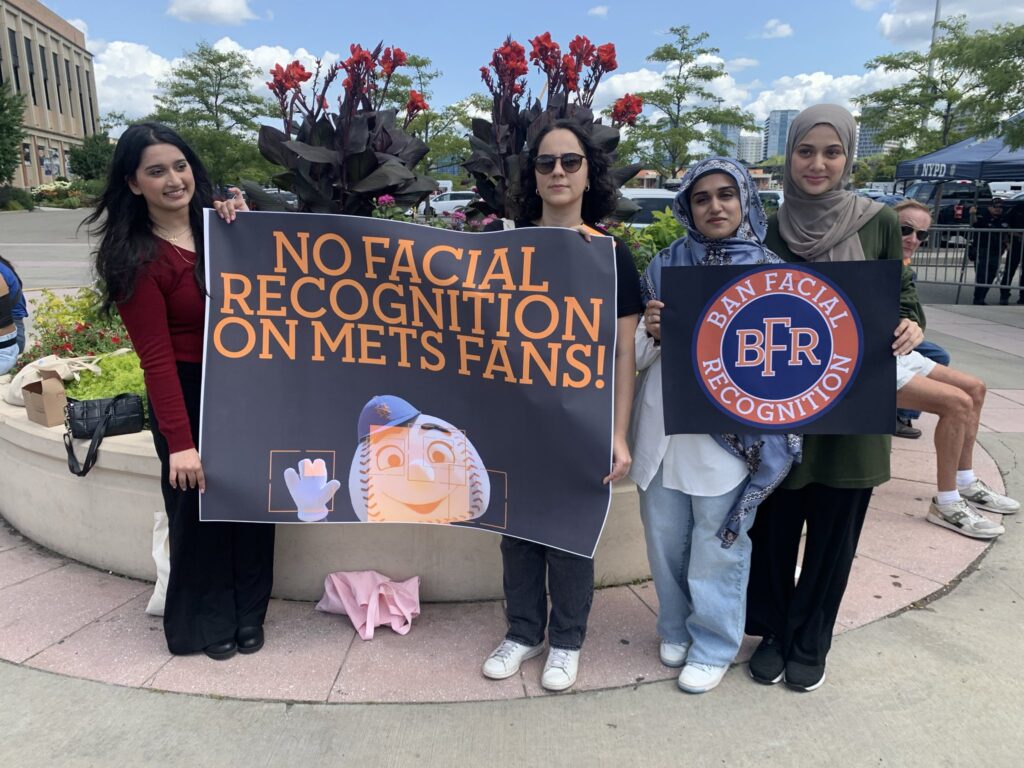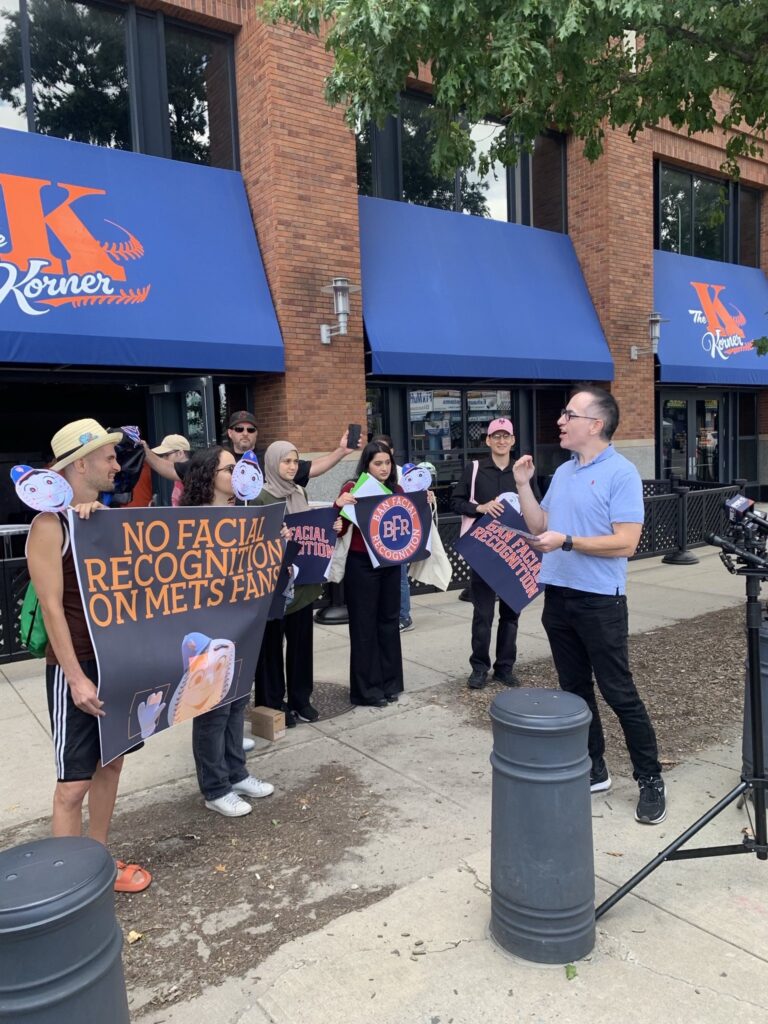Fans Cry Foul Over Facial Recognition at Citi Field
CONTACT:
S.T.O.P.: Albert Fox Cahn, albert@stopspying.org, 646-643-5862
Fight for the Future: press@fightforthefuture.org; Leila Nashashibi: +12404414066 (Signal only)
FOR IMMEDIATE RELEASE: Wednesday, August 21: Baseball fans and privacy advocates gathered outside the Mets home game today to protest Major League Baseball’s use of facial recognition ticketing systems. Protestors held banners and signs saying “No Facial Recognition on Mets Fans,” passed out flyers, and chatted with fans about the dangers of facial recognition ticketing systems and biometric collection tools more broadly.
The organizers delivered an open letter signed by Amnesty International, Access Now, American Friends Service Committee, Muslim Advocates, and other leading human rights groups calling for a ban on all forms of biometric data collection at Major League sports stadiums. They also called on the New York City Council to pass two bills banning use of facial recognition and other biometric surveillance by public accommodations, including arenas like Citi Field, and by landlords in residential buildings.


For years, biometric technologies like facial recognition have been creeping into professional sports in a range of forms, from event entry, to concession payments, to controlling players’ locker room access. Facial recognition ticketing is currently available at a range of stadiums across different leagues and last year the MLB launched its own system, “Go-Ahead Entry,” which has now launched at at least 5 stadiums.
Privacy experts and racial justice advocates have consistently sounded the alarm about the dangers of facial recognition, citing its potential for supercharging existing surveillance and discrimination, allowing private companies to bar entry to whomever they choose, creating opportunities for mass-scale biometric identity theft, chilling free speech and social movements, and increasing life-threatening encounters between people of color and violent police through false matches.
“As a lifelong Mets fan, I can’t help crying foul at their decision to install facial recognition ticketing,” said Surveillance Technology Oversight Project Legal Director David Siffert. “Baseball tickets and concessions already cost enough, and now our identities are part of the price tag. From Citi Field to Madison Square Garden, facial recognition is rapidly spreading across New York’s most iconic entertainment venues, putting our sensitive data at risk and exacerbating the over-policing of BIPOC, Muslim, and immigrant New Yorkers. The City Council must step in and ban biometric surveillance in public accommodations. Let’s go back to stealing bases, not faces.”
“Facial recognition technologies are invading every aspect of our lives. We simply cannot have a future where we are afraid of our own biometric data being taken advantage of when we are attending sports games. We, youth-voices, do not stand for the perpetuation of unchecked surveillance,” said Mira Schubert, Director of Political Advocacy at Encode Justice NY.
“Introducing facial recognition at ballparks is a surefire way to ruin America’s national pastime, or any outing to catch your favorite team. This is techno solutionism at its worst –– we don’t need to “fix” our current system of paper or digital tickets because it isn’t broken. And there is nothing convenient about giving your most sensitive personal information to a company that could sell it, share it, or leave it unsecured so it gets stolen,” said Caitlin Seeley George, campaigns and managing director at Fight for the Future.
In just one example exposing the dangerous inaccuracy of facial recognition, a 2019 experiment by the ACLU fed photos of high-profile professional athletes from Massachusetts to facial recognition software that falsely matched the official headshots of 27 athletes to mug shots in a law enforcement database.
Resistance to police and law enforcement use of facial recognition took off in 2020 and pushed top companies like Amazon, Microsoft, and IBM to put moratoriums on the sale of their facial recognition tools to law enforcement. Cities, counties and states also passed strict regulations on the use of facial recognition by law enforcement, raising issues of racial discrimination and invasion of privacy.
Since then, resistance to the use of facial recognition by companies and businesses has also gained momentum. Earlier this year, after news broke about the owner of Madison Square Garden using facial recognition to ban his foes from events, over 100 venues and artists signed a pledge opposing all forms of facial recognition at live shows. In 2022, over 300 artists shut down palm scanning ticketing at Red Rocks, citing similar concerns related to the mass collection of biometric data.

